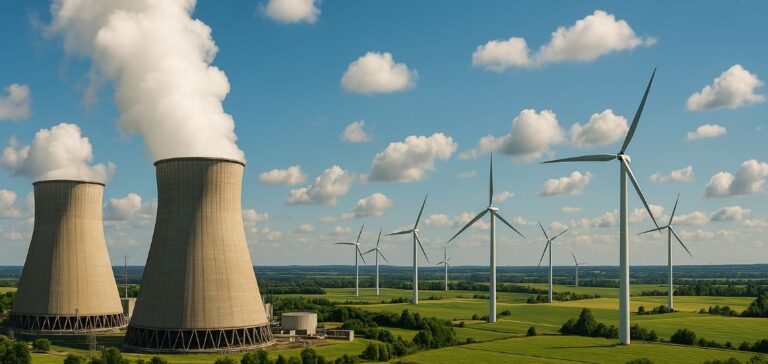The draft of the third Multiannual Energy Programming (Programmation pluriannuelle de l’énergie, PPE3) outlines the key pillars of France’s energy policy for the 2025–2035 period. Introduced under the law of 17 August 2015, this document guides the country’s trajectory towards carbon neutrality by 2050. It complements two other planning tools: the National Low-Carbon Strategy (Stratégie nationale bas carbone, SNBC) and the National Climate Change Adaptation Plan (Plan national d’adaptation au changement climatique, Pnacc), under the umbrella of the French Energy and Climate Strategy (Stratégie française pour l’énergie et le climat, Sfec).
Energy mix and consumption trajectory
The document sets out a progressive reduction of fossil fuels, which accounted for approximately 60% of final energy consumption in 2023, targeting a decrease to 42% by 2030 and 30% by 2035. This decline is to be offset by a rise in low-carbon electricity generation, increasing from 27% to 39% over the same period, along with an increase in non-electric renewable energies—such as biomass and geothermal energy—from 15% to 30%.
The PPE3 represents a shift from the previous 2019–2024 plan, abandoning targets to close nuclear reactors and instead confirming the sector’s revival as announced by President Emmanuel Macron in 2022. The government maintains the current pace of onshore wind development, reinforces ambitions for offshore wind, but slows the growth of solar photovoltaic capacity.
A process disrupted by political tensions
Originally expected in mid-2023, the publication of the PPE was delayed due to a series of public and institutional consultations launched in 2021. In 2024, the government withdrew plans to introduce legislation because of strong political divisions, referred to as a “religious war” by the Ministry of Energy. A decree was chosen to expedite implementation, despite the dissolution of the National Assembly and several cabinet reshuffles.
Mixed reactions from stakeholders
The draft has drawn criticism from across the political spectrum. More than 160 members of parliament, including former Électricité de France (EDF) Chief Executive Officer Henri Proglio, signed a letter criticising the plan as an “imposed trajectory” and for allegedly favouring renewables excessively. Industry experts challenged this view, stressing the need for a diversified supply strategy to achieve decarbonisation.
The public online consultation on the PPE draft closes this Saturday. In response to the controversy, Prime Minister François Bayrou proposed holding a non-binding parliamentary debate in the coming weeks. Additionally, a highly anticipated energy programming bill introduced by Senator Daniel Gremillet is expected to be reviewed before the summer.





















